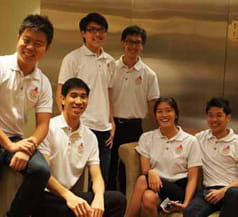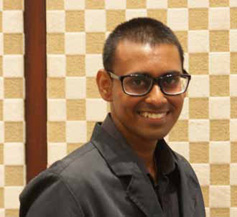Stories > Revving for Change
Revving for Change
Beyond the bottom line, the ripples of ethical enterprises are running further than ever, and this business direction looks like it’s spreading roots in a new generation of entrepreneurs.
By Vishwesh Iyer
There is a buzz among a younger generation of Singaporeans. It has yet to grab lead headlines, yet it rumbles with the change it has begun to create. The buzz is about marrying social issues with business solutions.
In this approach, money is not a bad word. Profit definitely remains a business goal, but doing it with a conscience underlines its reason for existence. These young innovators are asking, and showing, how the business world can provide solutions that serve a greater good. But turning a passion into a successful non-profit takes serious business acumen.
Needed And Valued
Whether the mission is as ambitious as pulling millions of people out of poverty or as modest as feeding the homeless in a neighbourhood, this may be the perfect time to get started. Social entrepreneurship has never been more needed, more valued and more achievable than it is today.
Social entrepreneurship is defined as an enterprise where an entrepreneur recognises a social problem or need and uses traditional business principles to organise, create, and manage a venture to address the need.
Just as entrepreneurs change the face of business, social entrepreneurs act as change agents for society, seizing opportunities to improve systems and create solutions that benefit society. While a business entrepreneur might create entirely new industries, a social entrepreneur comes up with new solutions to social problems and implements them to serve communities.
Past And Present
Some fine examples of social entrepreneurship have been set. Dr Maria Montessori from Italy developed the Montessori approach to early childhood education. English nurse Florence Nightingale, the founder of modern nursing, established the first school for nurses in Victorian England and fought to improve hospital conditions. Vinoba Bhave of India, founder of the Land Gift Movement, led the redistribution of more than 2.8 million hectares of land to India’s untouchables and landless.
As Singapore turns into a hotbed for social entrepreneurship in the region, some unique and quite successful firms have emerged. The Basement Cafe at the Singapore Management University donates 30% of its profits to charity; Conjunct Consulting, a volunteer-based service offers pro bono consulting to non-profit, social-sector clients; and Mettaphor is a company that mixes travel with volunteer work among the local people in Ladakh. They are some of many that are coming up with unusual ideas of blending business with social responsibility.
In this context, the Young Social Entrepreneurs (YSE) programme sponsored by the Singapore International Foundation (SIF) plays a critical role. The YSE helps in identifying and inspiring, equipping and enabling youths of different nationalities to embark on social enterprises in Singapore and beyond. We look at the four winning ideas in the next pages.
The New Wave
SIF’s Young Social Entrepreneurs (YSE) is now in its third year. This year’s 65 participants from nine nationalities went through a six-month programme that began with a workshop and continued with peer-to-peer sessions, business clinics and masterclasses on social entrepreneurship with and from leading social entrepreneurs and business professionals.
For the first time, the shortlisted teams were assigned mentors, led by leading business consultancy McKinsey & Company, and went on study visits to India and Thailand to undergo experiential learning, and exchange persepectives and insights with Ashoka (India) and Population & Development International (Thailand).
The platform aims to nurture a network of social entrepreneurs by harnessing ideas, know-how and resources to enrich lives and drive positive change for a better world.
After an intense battle of ideas, nine teams of six nationalities were shortlisted for YSE’s 2012 Pitching for Change event on 4 August 2012. All nine ideas were at different stages of development and each faced a different challenge. Impressed by the strategic thinking and essence behind all the ideas and their potential to bring real social benefits, the jury decided to have four instead of three winners. Asia Philanthropic Ventures (apVentures), a Singapore-based venture philanthropy outfit, provided seed funding of $10,000 to each of the four winning teams.
Based in Bago City in the Philippines, BagoSphere is a vocational training company that provides affordable and effective training programmes for unemployed and disadvantaged rural youth.
It provides one of the quickest ways for them to gain access to a full-time job in a multinational company which can pay them about US$250 a month. To do this, Bagosphere offers a two-month Call Centre Course, which trains rural youth in English communications, IT skills and other necessary knowledge to work in a call centre. The programme is currently still in development, and full classes will be launched by early 2013.
The idea for BagoSphere was conceived in June 2010 when cofounders Ivan Lau, Ellwyn Tan and Zhihan Lee met for the first time. Zhihan had then recently returned from a month- long study trip in rural India with a social enterprise that trained uneducated Indian youth for basic business process outsourcing (BPO) work. Ivan and Ellwyn had strong ties with the city government of Bago City, a small city in central Philippines, through past community service projects.
The idea thus blossomed to combine their experiences on both sides and introduce a BPO training model to Bago City to solve the local youth unemployment problem.
“We hope that we can similarly inspire the youth we work with to lift themselves out of poverty and lead meaningful lives,” says Ellwyn Tan, 27, co-founder, BagoSphere
Most modern women don’t realise what a huge difference a sanitary napkin can be to a young girl’s life. In underdeveloped areas of the world, low awareness and high cost make sanitary napkins uncommon among rural females. The less than hygenic methods they use to cope with their menses often mean teenaged girls missing about 50 days of school annually, besides possibly tragic consequences on their reproductive and overall health.
I.M.Pad sees a solution for women in rural India with biodegradeable sanitary napkins. The name of the Singapore-Malaysian team of Ho Yen Yee and Andrew Yin means “innovative and manageable sanitary pad”. The idea came from a project in Africa. It uses water hyacinth, an invasive tropical water weed, as the main and cheap material to produce sanitary pads as a cottage industry run by women. The business can be easily replicated from village to village.
The women are also key to spreading awareness among young girls and other females about the benefits of using sanitary pads. Coming full circle, the used pads can be composted with unused water hyacinth parts for fertilizer.
“I wondered how women in rural India coped with their monthly menstruation cycles. What could be done to help them lead normal functioning lives like we do?” says Ho Yen Yee, co-founder, I.M.Pad.
Start Now is Singapore’s first non-governmental volunteerism advocacy social enterprise. Start Now works with nonprofit organisations, schools and corporations to grow volunteerism in Singapore and Asia.
Through their portal www.startnow.sg, they connect volunteers from schools, corporate organisations and the public with a range of volunteering opportunities from professional services, administration, fund raising, welfare and social work to independent projects. Start Now shares volunteering stories and news through new media outlets to drive interest in this vital field that is such a key element of many nonprofit and voluntary welfare organisations.
While unaware of the term “social entrepreneurship” two years ago, Keith Tan and Ivan Chang, co-founders of Start Now, have managed to create an engaging matchmaking platform for enterprises, individuals and nonprofit organisations. Through it, enterprises and individuals can identify volunteering opportunities, and nonprofit and voluntary welfare organisations can easily find volunteers. The main source of revenue comes from enterprises looking at fulfilling their CSR mandates subscribing to use the enterprise platform by Start Now.
“It’s about building the spirit of volunteerism in Singapore and beyond — because everything good comes from that spirit,” says Keith Tan, co-founder, Start Now.
Young Sprout founders Joshua Ong and Suresh Zac Chandran got together last September to figure out a way to deal with two issues: the escalating cost of tuition that was putting the service out of reach for lower income families, and the lack of opportunities for moulding youth leaders. Their answer was an affordable learning centre where older students who have done well can come to provide low-cost tuition to primary school children who need the help. In the process, older students develop their teaching skills and leadership abilities.
The tuition service that began in February 2012 has already begun to win not just the approval of cash- strapped parents, but also young fans in their clientele.
Besides tuition, Young Sprout also includes workshops and excursions to broaden the education of their young charges. In turn, student mentors get to spread their wings learning to manage these events, and to share and shape values in young lives.
“I have always wanted to give back, and have always felt sad for children from disadvantaged families who didn’t have the right kindof support, and lacked role models to inspire them,” says Suresh Zac Chandran, co-founder, Young Sprout.






